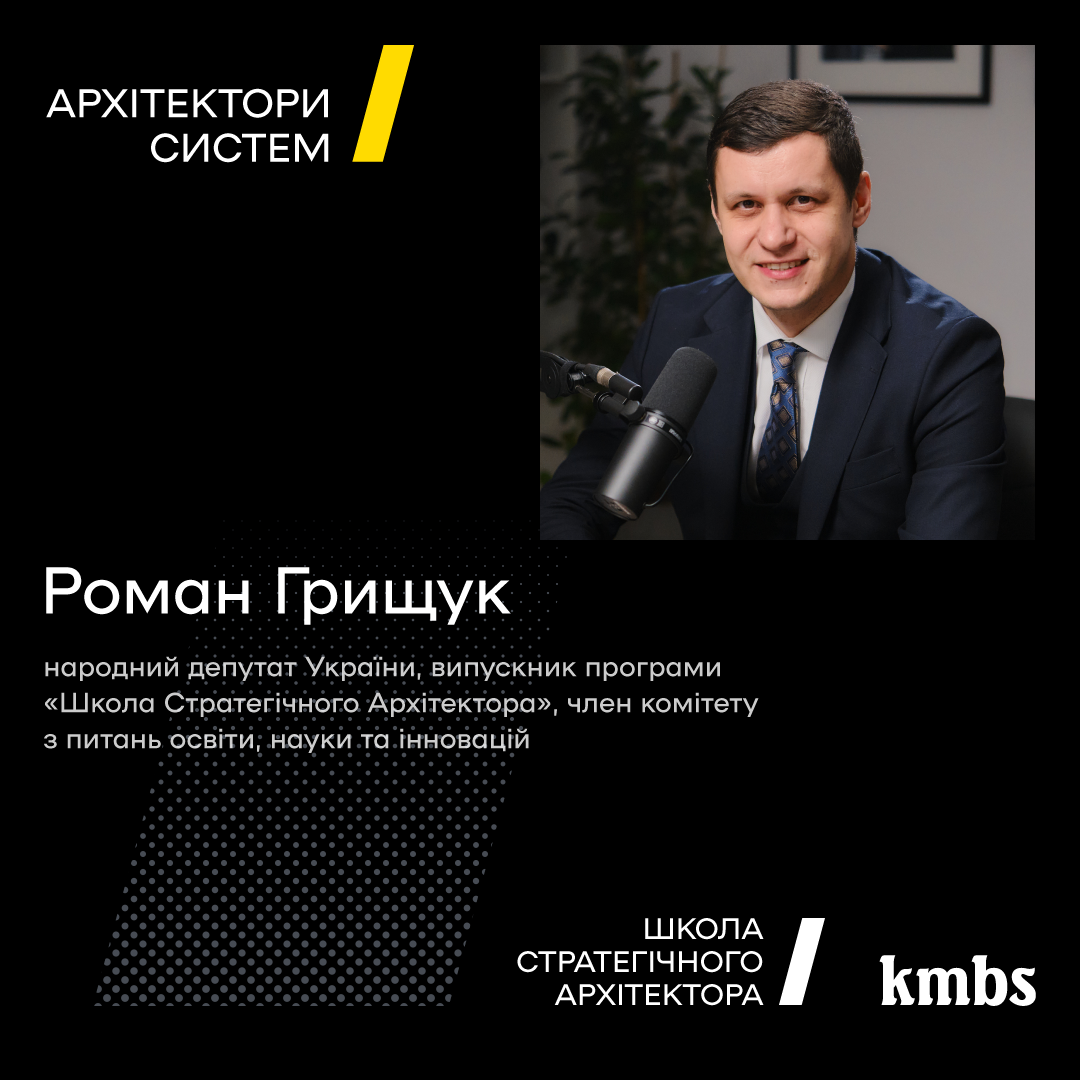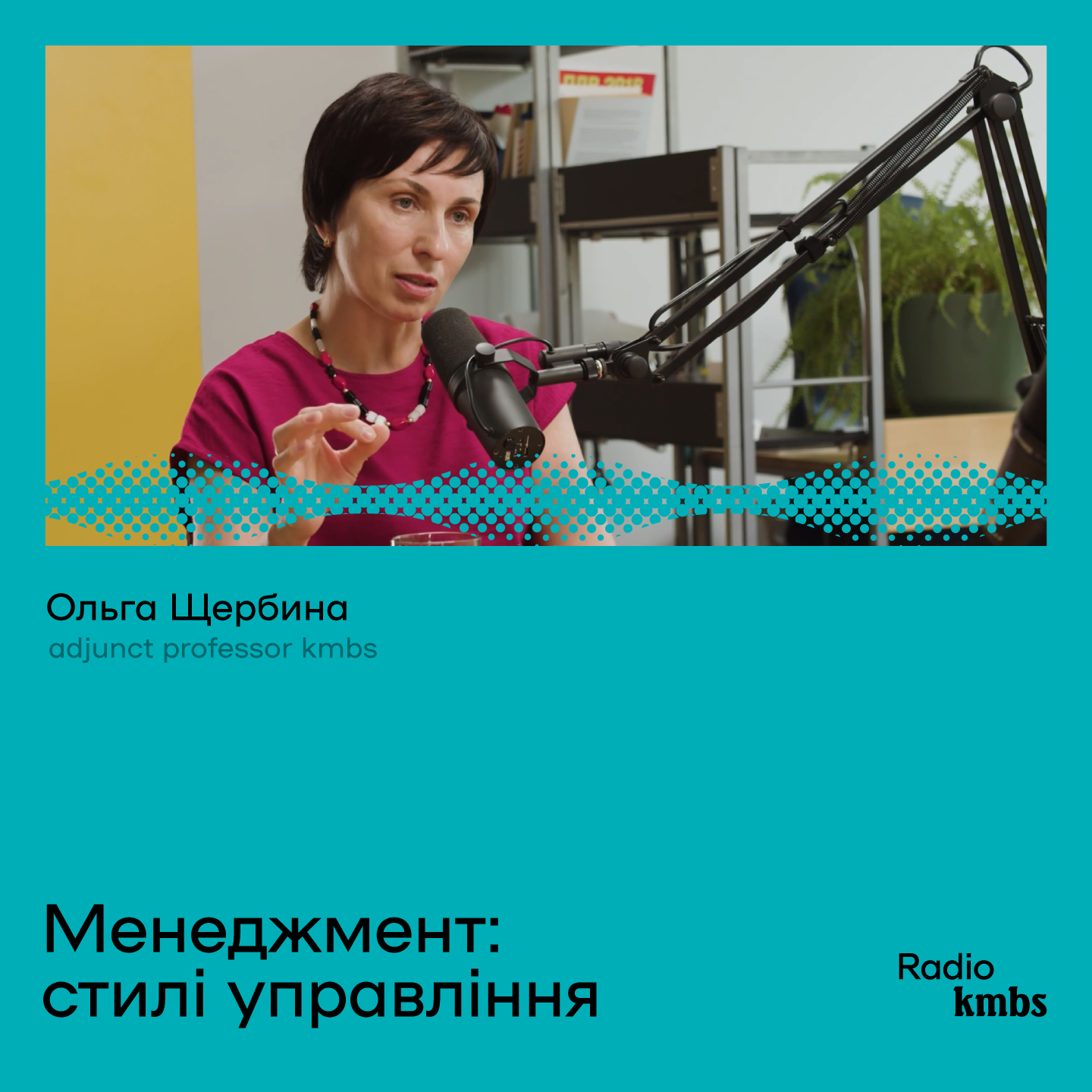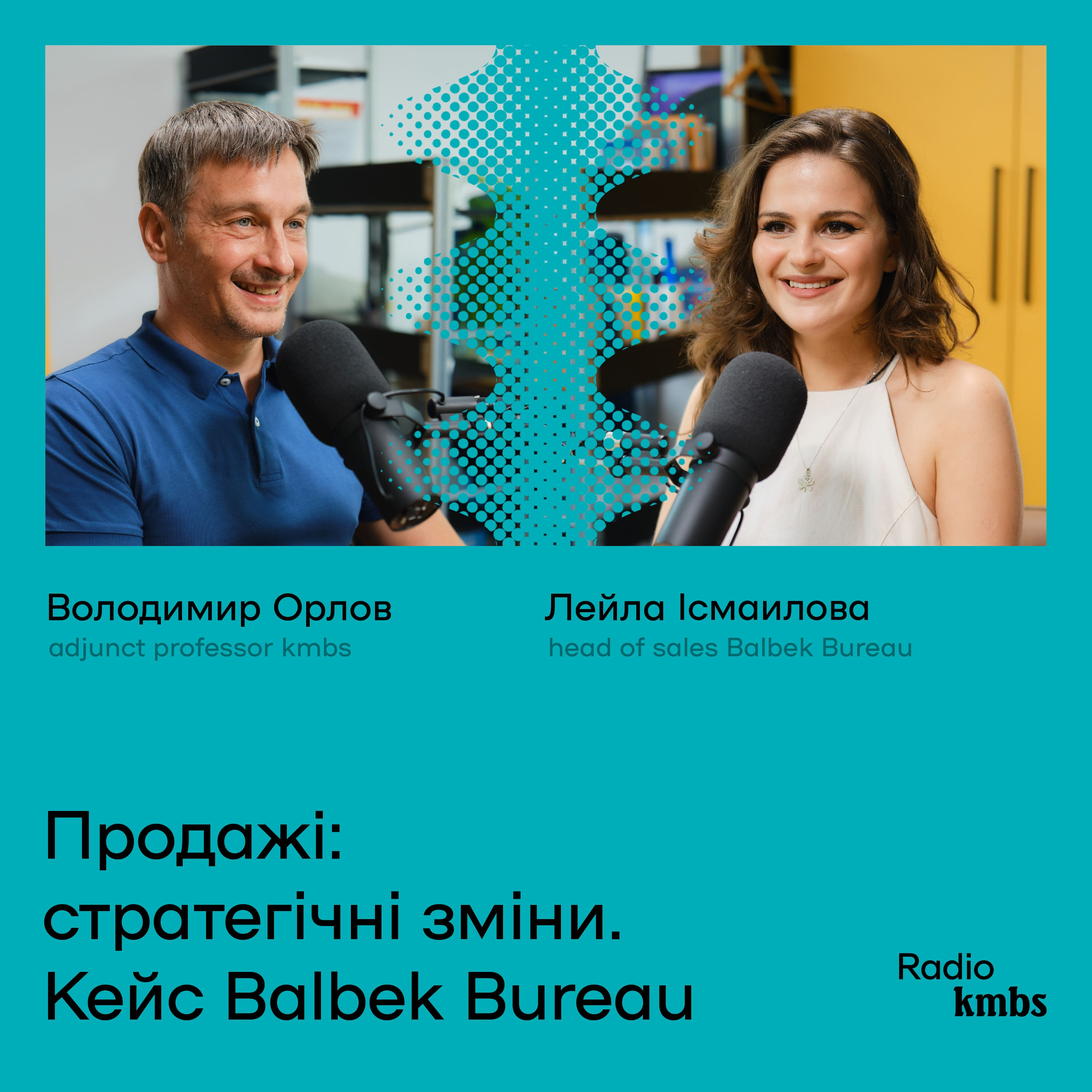Learn first
KMBS latest news in real time

For the latest KMBS events and news, visit KMBS Live at the top right corner of the screen
Open kmbs live 24.05.2022
24.05.2022 2536
2536 10min
10minHanna Sherman: The current humanitarian catastrophe, apart from the physical threat to life and the lack of security guarantees, is manifested in the fact that we, the representatives of the humanitarian sphere, are losing the opportunity to fulfill our professional purpose. What was the meaning of our lives today is a burden of conscience: it is as if you have no right to do so when people are deprived of what is necessary for physical survival. Can you comment on this guilt?
Oleksandr Savruk: The burden of conscience, or guilt complex, is the first thing that arises in every average person, especially in those people who do not currently provide basic needs for society. And this is something that needs to be fought because people who do things that we traditionally refer to as "culture" must have a strong-willed awareness: they are doing an essential something, and they have a burden of responsibility. They are responsible for preserving this culture, maintaining the ability to reproduce new cultural products and cultural achievements, providing longevity, and providing through such activities those things that we call meanings, meanings - the semantic field for which the struggle is taking place.
After all, today, the struggle is not only for square hectares or kilometers of territory. It happens for belonging, cultural beacons, and even memes - for all the factors that form the fundamental attitudes for the whole nation so that we have our own identity and can act in our way. And someone doesn't want us to work in our way.
The identity of the people - political, cultural, etc. - is an essential software component of systems that determines the logic of action and the ability to act, to develop strategies in their way. This is precisely the type of subjectivity we are fighting for and that someone doesn't like. This is work so that we have the opportunity to realize ourselves in our context with our natural expectations, preferences, hopes, and dreams. Cultural figures are primarily workers on this front line. And this must be realized every time there is a feeling of guilt or, as you said, the "burden of conscience."
HS: There is a particular awareness of global responsibility when I understand the whole amount of work that lies ahead and relates to the renewal of cultural and historical narratives. They must undergo global changes, both internally and externally, in that we will broadcast in response to the colossal demand for Ukrainian cultural content and context.
OS: I like that we are talking about the future. We need to think about it now. After all, we stand - and stand, I have no doubt! - for something. And this "something" must not only be reproduced and not so much produced as updated. After all, many things have manifested (what is real and what is not), cleared of many alluvial influences, which in one way or another worked in different previous contexts. We must remember all the incredible heroes of this cultural war who were destroyed physically, morally, and spiritually.
But now, all this must be converted, purified, and manifested in itself, in educational efforts, in internal communication with each other, within the country. We must think of children to explain all these things to them correctly, honestly, and openly, with all possible difficult moments.
Ukraine is now under the light of the stage. We are now very visible in the current situation, but tomorrow our visibility must also be presented in other cases. For example, our people abroad, the course of events in the country itself, particularly the test of democracy.
We must offer new value to those countries that have not had the same experience as us. Having gone through all these things, we can have a moral right, a specific authority to say what is right and wrong in today's fundamental assumptions and narratives. This is very important, and this is precisely the part that our cultural figures need to work on, whether they create products that can be touched or not. We must work now on everything that will carry and represent Ukraine in all its colorful manifestations. And it is also essential to give the soldier, the soldier who protects us, awareness: behind him, such work has not stopped. It is promising and creates an environment for the children of this soldier, for the future of our country.
HS: This war allowed us to re-evaluate certain things and processes. For example, in several conversations with different people, we had stated: that before the war, we doubted that we were able to give a decent resistance. We challenged our stability and ability to survive. In the first days of the war, this confidence took place. We believe that we will survive and win no matter how brutal and long this war is. And together with our fellow "fighters" of the cultural front, we suddenly realized that this confidence is based, particularly on the foundation that we laid in our activities in previous decades. Everything we thought was insufficient, not so beautiful and popular, worked. It proved to be effective. It may not be officially recognized as part of the victory. Still, this cultural platform, built by state institutions, non-state institutions, and formal and informal opinion leaders, has worked on our confidence.
OS: So confidence came when we knew ourselves, didn't it? When we saw ourselves when we felt in that situation. For us, this uncertainty was formed by other people's narratives, other people's subjects, and other people's people. We were shaped in the cultural sense. In the political mind, we were told that we could not resist. We have been told that we are secondary, do not exist, and are so soft, forgotten, and unhappy.
Over the last eight years, the military elite's elite has returned to Ukraine. These people can think more broadly, systematically, and take responsibility. They know the price of error and the price of achievement. They have formed their culture, and it has already appeared in our society through hundreds of thousands of people who have gone through challenging situations in the east and south.
This is what we were deprived of a little earlier - even though Ukrainians have traditionally had this component since Cossack times. The ability of Ukrainians to act was also used during World War II. It lived in Ukrainian but was not actualized as a critical, necessary, natural, and worthy part of our culture.
The political elite in this situation is also repackaging. We, one way or another, kept the rules of the game. We transferred the right to power. We were more or less democratic with all our problems. We have a political elite that is somehow formed, tested, etc.
And here, the cultural component of this game has experienced preservation and development in Ukraine. We have unique people who can act as individuals-institutions. For example, Valery Shevchuk, "against all the laws of physics," does outstanding archival research and translations and writes dozens of books on the scope of work of the entire institute. And it also forms a particular narrative that creates and reproduces us. Such people-institutions have miraculously replaced the Ukrainian formal institutions missing for the last few hundred years.
We have an incredible experience of bright personalities from Franko to Stus, who created robust coordinate systems. They found opportunities, made, sometimes starved, and suffered, but they went their way. And Ukraine is rich in such people. And now, it is essential for the state to feel them, find them, help them, and give them somehow the opportunity to turn on this lever so that they can sound within Ukraine and behind them. We see how Ukraine has become known in popular genres, how people react to the Kalush Orchestra or "Oh, in the meadow red viburnum." The song, which has been around for almost a hundred years, has suddenly become a hit, sung in Germany and the United States. These are the first manifestations that are important not to lose. How to work with this, how to help, how not to bureaucratize, but to find these sprouts and allow them to be realized is an exciting and essential work needed today.
Today, people need to think about theater, draw, photograph, write, rethink and reach a level of value that should be of interest to other countries. Ukraine will be attractive only if it creates a cultural product relevant to other players in the world's cultural space, not just for themselves. We have to live not only with our internal problems. We have this potential, and I believe it will be realized.
HS: It is very close to me that the strategy should be to create and disseminate your own. Many of my colleagues are determined only to eradicate the "Russian trail" from the international cultural communities and projects. And it seems to me that it is more constructive and reasonable to focus efforts on creating your own.
OS: I propose to throw out all these things because many cultural figures have suddenly mastered the lexicon of the civilization we are struggling with and not the best dictionary. He suddenly became legitimate. Russian mothers go by the word, and for some reason, we do not have the strength to beat one or another message in some of their intellectual abilities, rethink, and present in another way. If our cultural figures go down to this level, we will not be attractive to anyone.
We must always create, not just fight "against." By making it better, what we struggle with will fall away. It will be uninteresting. But this requires the logic of information hygiene and awareness that there is something, that is, where this or that cultural phenomenon forms a particular type of behavior. What is Dostoevsky? And what does it shape, give? Why do we have it or not to read and know it? What is Gogol in the Russian context, and what is Gogol in the Ukrainian context? We need to rethink this and talk about it with each other again. But just cutting something off is mechanical. And any mechanics is always insufficient. We need to review all this.
HS: Rethink and learn about it. I had an exciting conversation with Dmitry Omelyanovich Gorbachev, the most famous art critic and researcher of the history of Ukrainian art. He says that all the preliminary figures of Russian cultural narratives were, in fact, Ukrainians at a particular stage of their work. I think we can spread such evidence of the annexation of our cultural figures and cultural meanings that has taken place over the centuries.
OS: The problem is not that they want to annex but that we succumb in a broad sense. We once had an exhibition by Alexander Roitburd at kmbs, and one of our participants asked him about "Russian peace." And he answered harshly, figuratively, and classily: "you are from Mohyla. You created this Russian measure. You deal with it."
We need to understand why it happened and why it will happen again. Why was Vyhovsky - and why - Theophanes Prokopovich, that is, two opposite actions in relation with the n peace. We need to understand ourselves as in an intellectual mirror - and this is precisely the task of current cultural figures. They have to rethink and tell it all, but it's interesting to do. Not formally, in scientific ways, texts that no one reads. These should be open discussions with living people entitled to good tough questions.
We have to deal with ourselves first of all, including Mohylyanka. After all, she did so positively and gave a lot into other people's "wrong" hands. And it is our responsibility today to consciously draw conclusions and create our products based on our experience. Ukraine has the right to do so. As a prism with light, we can now decipher many phenomena from the past and present to make it clearer to society what to do with them.
What is the big problem today, including with business managers? When they ask for a training product, they ask, "tell me what to do?" or "what should be the model now?" etc. Here I like the logic of the work of cultural creators, say, a conditional director. He will never say what and how to do to the audience after leaving the theater. The viewer receives something more substantial, something more profound, and must then understand for himself in what way and how to proceed. This is a work of a deeper level, with the education of its aesthetic and ethical component, the ability to rethink, awareness, and verbalization.
And narratives, and assumptions, which are sewn into the logic of action, must be made qualitatively by the people we refer to as cultural creators.
HS: It turns out that the creation of platforms for the maturing of the professional community to new meanings and narratives, to new algorithms of interaction with the audience, in particular, the world - this is the direct missionary purpose of specialized art periodicals.
OS: Absolutely, because you have to maintain and develop this infrastructural element, but with the logic of openness. This democracy, search, and natural selection of the best interpretations and references distinguishes us today from the reason of the institutional phenomena of the past. Today we have experienced the joy and power of a horizontal type of network subject relationship, such as your project. It is becoming imperative that, in the end, we need to have good criticism in the cultural field and access to information. We need to be integrated and interact with other similar infrastructural elements in Europe, America, and other parts of the world that are for us. are interesting. So that we can exchange, offer, and update Ukrainian in the modern international.










